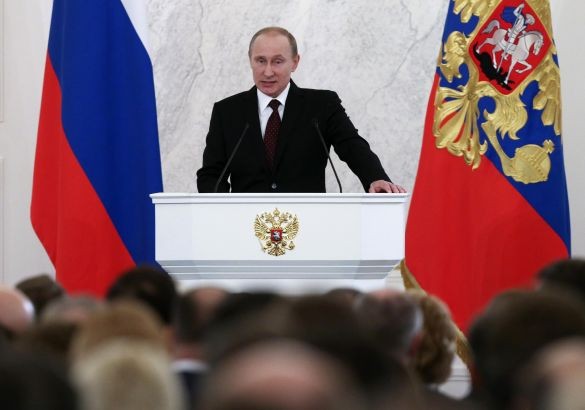(VOVworld) – In his state-of-the-nation address to the Federal Assembly on December 12, Russian President Vladimir Putin presented Russia’s viewpoints and orientations on several regional and world issues relating to Russia’s strategic interests. He focused on plans to make the nation prosper and reiterated his unswerving stand on dealing with critical international issues. VOV summarizes the key points of the speech.

Putin made the State-of-the-nation address in the Kremlin on Thursday. (Photo: The Moscow Times) |
Putin made his annual address to members of the Council of Federation, State Duma, and Government on Thursday. It was the 20th state-of-the-nation address in Russia's recent history and the 10th delivered by Putin.
Strengthening national unity, combating separation and division
In last year’s address, Putin focused on the prohibition against Russian officials opening foreign bank accounts. The highlight of this year’s address was national unity.
Putin said Russia has multiple groups who share a culture and language. His administration pays special attention to enhancing national unity and combatting any sign of insular nationalism, separatism, or racism that threatens division in Russia. Russia has no better alternative than to develop a democratic society based on social needs under Russian law, not conditioned by outside forces. Russia is developing democracy in a controlled way, supports people’s initiatives, encourages the voice of localities in legislative agencies, creates conditions for fair political competition which places national interests and unity foremost, and combats any behavior that seeks to take advantage of competition to threaten national unity and Russia’s continued existence.
Slow economic growth due to internal reasons
Previously, Putin and many other Russian officials attributed Russia’s slow economic growth to the impact of the global economic downturn, especially the Eurozone crisis. In this national address, Putin frankly stated that the main cause is not pressures from the outside. He appealed for a reform of Russia’s current economic model, saying an advanced market economy rather than state capitalism should be the core of the new growth model.
Russia will take the lead in protecting international law
Regarding external policies, Putin said Russia does not aspire to impose conditions on its partners and will constantly protect regulations of international relations. He reminded his audience that in recent years the world has seen efforts to impose on other nations the so-called “advanced model of development”. Those efforts have ended in economic decline and bloodshed.
As President of the G8 emerging nations in 2014 and host of the BRICS summit of newly industrialized countries in 2015, Russia will work with its partners for common interests and to resolve urgent international issues such as weapons of mass destruction, terrorism, and drug trafficking.
Putin rejected assurances that the EU missile shield is only intended for national defense. He said the missile plan has a potential offensive capability and warned that no one should nurture an illusion of having a military advantage over Russia. The Russian government has allocated over 700 billion USD to developing Russia’s armed forces and modernizing its defense industry by 2020.
Regarding Iran’s nuclear issue, Putin said a long-term solution must be found that ensures Iran’s right to develop nuclear energy for peaceful purposes and guarantees safety for all regional countries, including Israel.
Turning to Ukraine, Putin said that if Kiev agrees, Russia will push for Ukraine’s participation in some agreements of the Customs Alliance.
President Putin’s state-of-the-nation address clearly delineated Russia’s national development orientations and how he perceives its position in the international political arena.